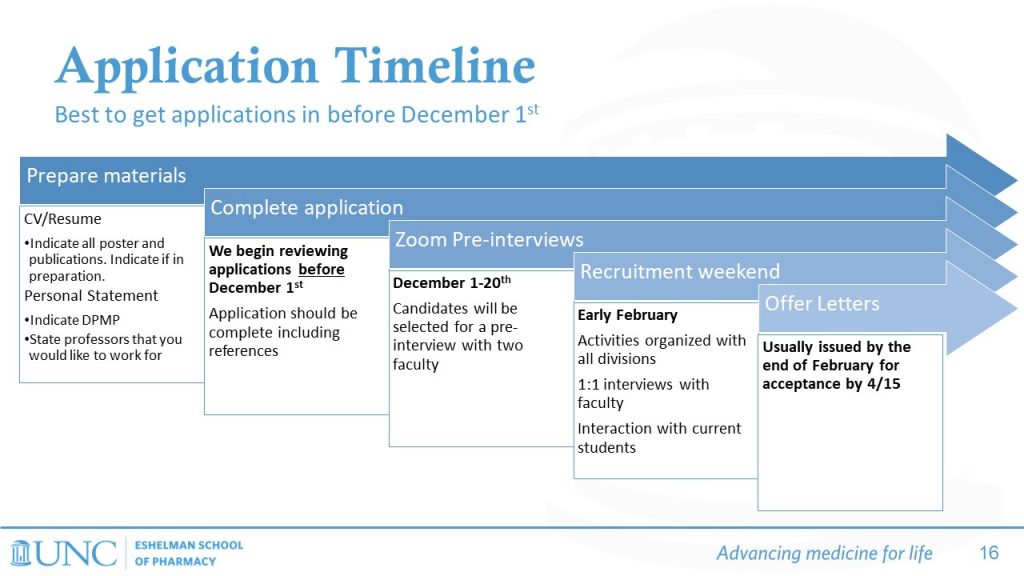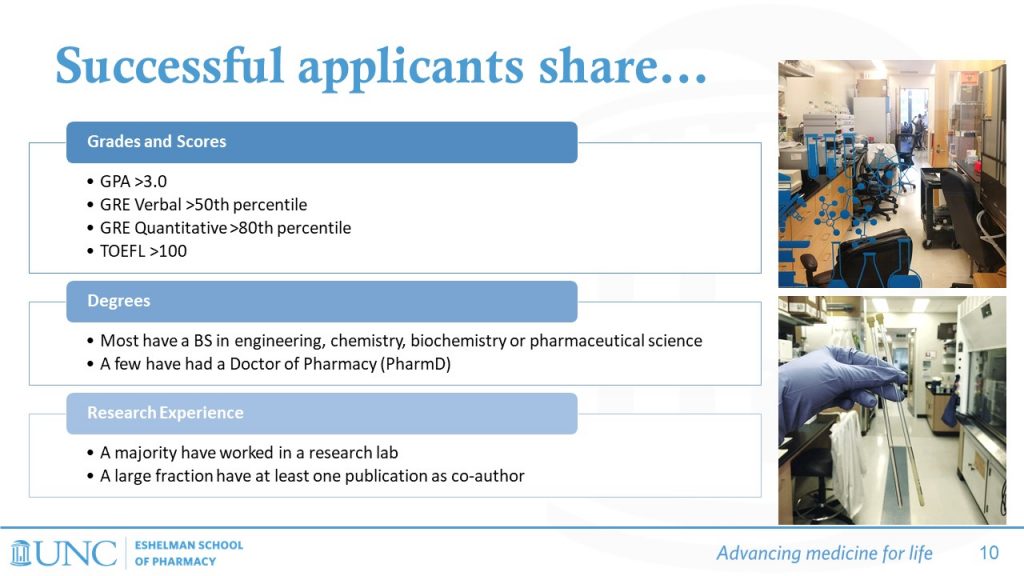GRAD LIFE IN AINSLIE LAB
Likely the Ainslie Lab will take at least one student for the Fall 2022 incoming class and will most likely take at least one student in the Fall 2023-24 year.
The Ainslie Lab accepts graduate students from the following programs:
- Division of Pharmacoengineering and Molecular Pharmaceutics (DPMP) in the Eshelman School of Pharmacy
- Biological & Biomedical Sciences Program (BBSP) at UNC Chapel Hill where students matriculate into DPMP or the Department of Microbiology and Immunology
- UNC/NC State Joint Biomedical Engineering Department (BME)
If you email Dr. Ainslie about your interest in her lab, It is helpful if you indicate which program you are intending to apply.
Rotations: DPMP and BBSP have two and three rotations, respectively. Rotations significantly help students to determine if they are a good fit for the lab. Each rotation is approximately 10 weeks in length. BME typically does not have rotations and students are directly admitted into labs. For the Ainslie lab, we have it structured so the rotation student first learns three things:
- To make acetalated dextran from a protocol.
- To make emulsion/solvent evaporation microparticles from a protocol.
- To do mammalian cell culture, if not already known.
Each rotation student is assigned a go-to graduate student or post doc to help schedule trainings and answer questions as needed. Rotation students are given an independent project that uses these three skills. Projects would be assigned based on the student’s background and project of interest. Examples of projects for rotation students have been:
- Exploring the generation of Tregs in vitro with different treatments
- Encapsulating a single adjuvant in particles of different degradation rates and evaluating cellular activity when cultured with macrophages or dendritic cells.
- Developing new spray dry methods to encapsulate protein or small molecules.
- Generating particles through different processes (e.g., emulsion, spray drying, electrospray) and comparing a cellular response.
- Combining tolerogenic agents and evaluation of the generation of anti-inflammatory cytokines.
During the rotation, students are assigned to a theme group (e.g. influenza vaccine, autoimmune vaccine) with other post docs and students in that topic. We meet weekly in these groups to go over everyone’s progress and plan the next steps for experiments. We also meet weekly in lab meeting with everyone where there is a journal club or someone presents on their research.
Skills learned in the lab: In the lab students learn some basic chemistry knowledge but mostly rely on in vitro and in vivo immune assays. Depending on the training program of the student, their work may gear towards pharmaceutical sciences or immunology or engineering. Students learn animal handling and models of disease (e.g. influenza, MS, T1D), cell culture, multiple assays including ELISAs and ELISpots, flow cytometry, SEM, NMR, characterization of humoral and cellular responses, confocal and many other techniques. You can check out where our alumni work on the People>Alumni tab above.
Mentoring: Dr. Ainslie has an open-door policy for students and post docs. Students meet bi-weekly in theme group meetings with post docs to go over a prepared progress report and discuss upcoming experiments. There is also a weekly whole lab meeting where journal clubs or research presentations are given. Training and mentoring also occurs between graduate students and post docs in the lab, as well as members of collaborating labs.
Project Management: Students are given a lead project but also help the theme group. For example, when we do a vaccine study, we often have to pull 40+ mice spleens, so we usually work in teams of 4. Similarly when we vaccinate it is easier if there are two people doing it. Everyone has a lead project (or multiple ones, depending) and this allows for 1st authorship as well as minor authorship on the work of other team members. Also it facilitates proper training and development of the student’s skills. Additionally, students tend to pick up side projects (as time allows) either of Dr. Ainslie’s choosing or by themselves.
Organization: Lab events are managed by a shared Google Calendar. Protocols, lab templates, example posters, example presentations and other helpful items are shared on a Microsoft Teams page. We use Signals Digital notebooks for data collection.
What makes a student competitive for the Ainslie Lab: From the pool of students who are accepted in one of the above programs, we are looking for students who are self-motivated and willing to commit time to their lab work and go about it in an efficient manner. Students must have the analytical capacity to prepare and interpret data without data manipulation, falsification, or fabrication. As a student develops, we focus a lot on writing and presenting science properly as well as other professional development skills that prepare them for their indicated future career. Absolutely any form of racism, sexism, bigotry, and discrimination will not be tolerated by any member of the lab.
Suggestions to graduate students who are looking to choose an advisor:
- Pick an advisor and lab first, then a project.
-
- Essentially you are ‘married’ to that advisor and lab for around 5 years. If you do not have a good relationship it will not make for a good graduate experience.
- Projects might change, your relationship with your advisor is paramount to your success.
- You will need help from the post docs and graduate students in the lab. It will be easier for you if they are able and willing to help you.
- If the students in the lab and past students do not have many papers, that is an indicator that you may not have many papers. (Assistant professors get a pass on this as they are just starting out!)
- If the lab is a mess and the equipment is constantly broken or not well maintained then that will only add extreme difficulty to your PhD.
- Lab alumni should have jobs in areas where you want to get a job.
What does the timeline look like for application to the DPMP graduate program?
What does a competitive student have when applying to the DPMP PhD program?


